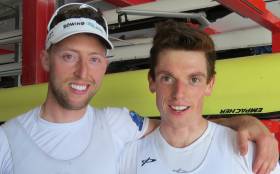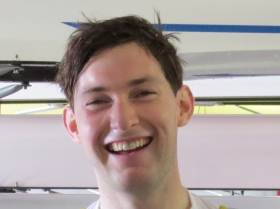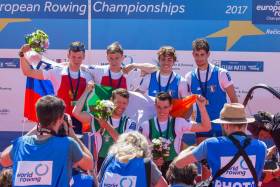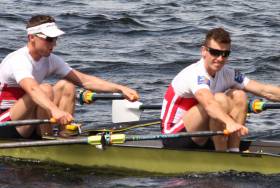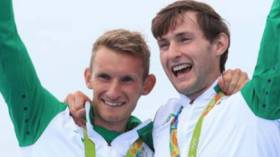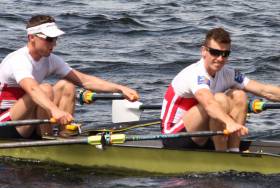Displaying items by tag: Mark O'Donovan
#Rowing: Shane O’Driscoll and Mark O’Donovan won the A Final of the lightweight pair at the World Cup in Lucerne today. They swept past early leaders Britain in the third quarter and won well. Russia showed surprising pace late on to take silver, while Brazil took the bronze, ahead of Britain’s Sam Scrimgeour and Joel Cassells.
O’Driscoll and O’Donovan won World Cup gold in Belgrade and Poznan and are European champions thanks to their win in Racice.
World Cup Regatta, Lucerne – Day Two (Irish interest)
Men
Lightweight Pair – A Final: 1 Ireland (M O’Donovan, S O’Driscoll) 6:34.00, 2 Russia 6:36.28, 3 Brazil 6:37.50; 4 Britain 6:38.84, 5 France 6:45.94, 6 Norway 6:58.68.
Lightweight Double Sculls – Semi-Finals (First Three to A Final; rest to B Final) – Semi Final One: 1 France 6:20.57, 2 Belgium 6:24.68, 3 Greece 6:26.92.
Semi Final Two: 1 Italy 6:20.82, 2 Czech Republic 6:22.05, 3 Ireland (G O’Donovan, P O’Donovan) 6:23.75; 4 Britain 6:25.25, 5 Japan Two 6:27.84, 6 Russia 6:34.33.
Women
Single Sculls Semi-Finals (First Three to A Final; rest to B Final) – Semi Final One: 1 Austria (M Lobnig) 7:35.06, 2 Germany (A Thiele) 7:35.96, 3 Britain (V Thornley) 7:36.09; 4 Ireland One (S Puspure) 7:36.90; 6 Ireland Two (M Dukarska) 7:55.0.
#Rowing: Shane O’Driscoll and Mark O’Donovan finished well to take second in their lightweight pair exhibition race at the World Cup regatta in Lucerne today. Britain’s Joel Cassells and Sam Scrimgeour took over at the head of the field Ireland crew early on and stayed there despite pushes by Brazil and Ireland. The South American crew looked to have taken second coming up to the line, but O’Driscoll and O’Donovan snatched it from them by three hundredths of a second.
The Final is on tomorrow, Saturday.
World Cup Regatta, Lucerne, Day One (Irish interest)
Men
Lightweight Pair – Exhibition Race: 1 Britain (J Cassells, S Scrimgeour) 6:57.32, 2 Ireland (M O’Donovan, S O’Driscoll) 6:59.26, 3 Brazil 6:59.29.
Lightweight Double Sculls (First Two to A/B Semi-Finals; rest to Repechage) – Heat One: 1 France 6:27.36, 2 Britain One 6:30.70. Heat Two: 1 Greece 6:25.88, 2 Czech Republic 6:26.39; 3 Ireland (G O’Donovan, P O’Donovan) 6:28.63. Heat Three: 1 Italy 6:29.15, 2 Belgium 6:32.44.
Women
Single Sculls (Three to Quarter-Finals; rest to quarters or E Final) – Heat Three: 1 Austria (M Lobnig) 7:46.97, 2 Ireland Two (M Dukarska) 7:51.44, 3 Latvia (E Gulbe) 8:02.20.
Heat Five: 1 Britain (V Thornley) 7:45.65, 2 Ireland One (S Puspure) 7:47.84, 3 Finland (E Karppinen) 7:58.04.
#Rowing: Paul O’Donovan set a new personal best as a single sculler at Cork Regatta today. The Skibbereen sculler won the Division One A Final in six minutes 50.819 seconds. Gary O’Donovan was 13 seconds further back in sunny conditions with a cross-tailwind.
Sanita Puspure pulled out of the women’s single sculls final, but she had already won the heat, beating Monika Dukarska by six seconds. Dukarska won the final.
Mark O’Donovan and Shane O’Driscoll beat Shane Mulvaney and David O’Malley by 3.4 seconds after a good race in the men’s pair.
Cork Regatta, National Rowing Centre, Day One (Selected Results)
Men
Eight – Div Two – A Final: 1 UCD B (club two) 6:22.449, 2 Shandon (jun 16) 6:36.97; 4 Trinity (nov) 6:41.7.
Four – Div One, coxed – A Final: 1 NUIG (inter) 6:22.49; 4 UCD B (sen) 6:28.46; 6 Neptune (jun 18A) 6:38.53.
Pair – Div Two – A Final: 1 Skibbereen (sen) 6:36.43; B Final: 2 Cork (jun 18A) 7:03.17. C Final: 5 Neptune A (club one) 7:16.46.
Sculling,
Quadruple – Div One – A Final: 1 UCC, UCD, Skibbereen (sen) 5:57.88; 2 Three Castles (jun 18A) 6:11.99. B Final: UCC (club one) 6:38.49.
Double – Div Two – A Final: 1 Shandon (jun 18B) 6:57.74; 3 Waterford (club two) 7:04.61; 4 Castleconnell A (jun 16) 7:11.77.
Single – A Final: 1 Skibbereen (P O’Donovan; sen) 6:50.82. B Final: 3 Shandon (D Begley; inter) 7:19.11; 4 Castelconnell (J Quinlan; jun 18A)
Women
Eight – Div Two – A Final: 1 Skibbereen (club two) 6:54.5; 5 Trinity (nov) 7:21.92; 6 St Michael’s (jun 16) 7:26.8.
Four, coxed – Div One – A Final: 1 Cork (sen) 7:22.85, 2 NUIG (club one) 7:27.0; 4 Shannon (inter) 7:36.13.
Pair – Div One – A Final: UCC/UCD (sen) 7:35.97; 5 Trinity B (inter) 7:53.23. B Final: Lee (jun 18A) 8:00.457. C Final: Belfast BC (club one) 8:08.607.
Sculling, Quadruple Div One - A Final: Lee (Jun 18A) 6:50.22
Div Two – A Final: 1 Shandon (club two) 7:28.86, 2 Castleconnell (jun 16) 7:31.09; 5 Shandon (jun 18B) 7:54.69.
Double – Div Two – A Final: 1 Carlow (jun 16) 7:44.19; 5 Graiguenamanagh (jun 18B) 8:17.88; 6 Killorglin (club two) 8:23.69.
Single – Div One – A Final: 1 Killorglin (M Dukarska; sen) 7:40.23; 3 Skibbereen (A Casey; jun 18A) 7:56.17; 4 Skibbereen (O Hayes; lwt) 7:59.73. C Final: 2 Skibbereen (L Heaphy; inter) 8:11.60; 6 Garda (J Ryan; club one) 8:44.57.
Gold for O'Donovan and O'Driscoll at World Cup Rowing
#Rowing: Ireland’s Mark O’Donovan and Shane O’Driscoll resisted a strong challenge by Britain to take gold in the lightweight pair at the World Cup Regatta in Poznan, Poland.
The Irish started well and led through halfway and the 1500 metres mark. Britain’s Sam Scrimgeour and Joel Cassells kept the pressure on and lost by under a length. Brazil took bronze in this three-boat race.
World Cup Regatta, Poznan, Day Two (Irish interest; selected results)
Men
Lightweight Pair – Final: 1 Ireland (M O’Donovan, S O’Driscoll) 6:32.93, 2 Britain (J Cassells, S Scrimgeour) 6:34.17, 3 Brazil 6:37.21.
Women
Pair – Repechage (First Four to A Final; rest to B Final): Australia 7:15.41, 2 New Zealand 7:16.26, 3 Chile 7:17.86, 4 Britain 7:22.94; 5 United States Two 7:28.76, 6 Ireland (A Keogh, A Crowley) 7:35.93.
Single Sculls – Semi-Finals (First Three to A Final; rest to B Final)
Semi-Final One: 1 Austria (M Lobnig) 7:29.08, 2 China (J Duan) 7:31.25, 3 New Zealand (H Osborne) 7:32.80; 4 Ireland One (S Puspure) 7:35.99, 5 Austria Two 7:42.16, 6 Germany Two 7:49.93.
Semi-Final Two: 1 Britain (V Thornley) 7:29.58, 2 Germany (A Thiele) 7:33.43, 3 Ukraine (D Dymchenko) 7:35.50; 4 Ireland Two (M Dukarska) 7:37.19, 5 United States One 7:38.05, 6 United States Two 7:42.84.
Lightweight Single Sculls – Semi-Finals (Three to A Final; rest to B Final) – Semi-Final One: 1 New Zealand 7:44.06, 2 Poland 7:45.45, 3 Switzerland 7:48.27.
Semi-Final Two: 1 Sweden (E Fredh) 7:40.68, 2 United States (M Jones) 7:41.38, 3 Ireland (D Walsh) 7:42.79; 4 Russia 7:44.47, 5 Netherlands 7:51.60, 6 Austria 7:58.54.
A Final: 1 New Zealand 7:36.89, 2 Poland 7:37.19, 3 Switzerland 7:37.20; 4 Sweden 7:37.75, 5 United States 7:43.07, 6 Ireland (Walsh) 7:48.91.
#Rowing: The Afloat Rowers of the Month for May are Mark O’Donovan and Shane O’Driscoll. The Ireland lightweight pair took gold at both the first World Cup Regatta in Belgrade and, with a remarkable performance, the European Championships in Racice. The two Skibbereen men were disappointed to see the lightweight four, a boat in which they have campaigned, removed from the Olympic programme earlier this year. But they have left this – and international opponents – behind them since.
Rower of the Month awards: The judging panel is made up of Liam Gorman, rowing correspondent of The Irish Times, and David O'Brien, editor of Afloat magazine. Monthly awards for achievements during the year will appear on afloat.ie. Keep a monthly eye on progress and watch our 2017 champions list grow.
#Rowing: A mini-storm which damaged the starting pontoon caused the abandonment of Friday's afternoon session of the World Cup regatta in Belgrade. Mark O’Donovan and Shane O’Driscoll had been set to compete in the repechage of the men’s pair. This race has now been scrapped. Poland, for medical reasons, and Ireland were allowed to withdraw fom the draw. The men’s pair semi-finals will go ahead on Saturday, with the two crews which did not qualify directly allowed to row in the semi-finals.
There will be a race for lanes in the lightweight men’s pair at 9.06 Irish time on Saturday. The final is set for 9.10 Irish time on Sunday.
#Rowing: Shane O’Driscoll and Mark O’Donovan finished fast but could not nail down a place in the top three in their heat of the men’s pair at the World Cup Regatta in Belgrade this morning. The Ireland lightweight pair competed in this more difficult event to up their competitive programme. Three crews of the four qualified directly for the semi-finals and Ireland stayed close to the top three for much of the race. Coming up to the line Britain, the Netherlands and Spain had the places collared, despite a good sprint by O’Driscoll and O’Donovan.
World Cup Regatta, Belgrade Serbia, Day One (Selected Results; Irish interest)
Men
Pair – Heat Two (First Three to A/B Semi-Finals; rest to Repechage): 1 Britain 6:42.81, Netherlands 6:46.34, 3 Spain 6:50.69; 4 Ireland (M O’Donovan, S O’Driscoll) 6:53.50.
Women
Lightweight Single Sculls – Heat Two (First Two to A Final; rest to Repechage): 1 Ireland (D Walsh) 8:07.51, 2 Poland (J Dorociak) 8:08.22;
3 Switzerland Two 8:11.65
O'Donovans Back in Action at World Cup Regatta
#Rowing: The 2017 World Rowing Cup series starts in Belgrade, Serbia tomorrow (Friday), running until Sunday. The regatta has attracted rowers from 26 nations and ranking among the medal prospects are athletes who won medals at the Rio 2016 Olympic Games. Ireland’s O’Donovan brothers, Paul and Gary, are back together for 2017 following their Olympic silver medal performance in the lightweight men’s double sculls, with their most notable competition being two of Great Britain’s most experienced lightweight rowers – Peter Chambers and Will Fletcher.
Shane O’ Driscoll and Mark O’Donovan will race in the men’s pair, in both the lightweight and heavyweight categories. Two-time Olympian Sanita Puspure will once again compete in the women’s single sculls, while Denise Walsh will feature in the lightweight equivalent. Puspure will come up against frequent opponent and fellow Rio Olympian, Belarussian Ekaterina Karsten. Puspure lost out to Karsten in the quarter-finals in Rio and went on to finish five positions back from her, in 13th place.
This is the first of three World Cup events in 2017. The season opener is generally an opportunity for teams to experiment with athletes and crews and see which combinations may work for the season ahead. In this post-Olympic year, it will be particularly interesting to see what the opposition holds due to retirees, new athletes/combinations and new talent emerging.
Friday’s start times are as follows (Irish times/all heats):
Lightweight Women’s Single Scull
09:05 – Denise Walsh (Skibbereen RC)
Men’s Pair
09:30 – Mark O’ Donovan (Skibbereen RC)/Shane O’ Driscoll (Skibbereen RC)
Women’s Single Scull
10:20 – Sanita Puspure
Lightweight Men’s Double Sculls
10:50 – Gary O’ Donovan (Skibbereen RC)/Paul O’ Donovan (UCD BC)
O'Donovans Lead International Brigade at Skibbereen
#Rowing: Paul O’Donovan maintained his dominance in the single sculls with a win over his brother, Gary, at the Skibbereen Grand League Regatta at the National Rowing Centre. Daire Lynch missed the race through illness. Shane O’Driscoll and Mark O’Donovan of the host club were emphatic winners of the pair, but Shane Mulvaney and David O’Malley had withdrawn from the heats because Mulvaney had suffered heart palpitations. He was taken the hospital for observation.
Sanita Puspure won the single sculls final with over 11 seconds to spare over Monika Dukarska. Aileen Crowley of UCD, just back from Australia, was third. The women’s pair was won by the UCC crew of Aifric Keogh and Aoife Feeley. UCD’s Ruth Gilligan and Eimear Lambe, with a reverse of the usual order which saw Gilligan move to stroke, did not do well in the heat and competed in the B Final.
Skibbereen Grand League Regatta, National Rowing Centre (Selected Results; with Per Centage of Projected World Best Time)
Men
Eight – Division Two – A Final: 1 Queen’s (nov) 7:04.6. 3 Univ of Limerick (club two) 7:25.3, 6 Col Iognaid (jun 16) 7:40.6.
Pair – A Final: 1 Skibbereen (sen) 7:43.6 (80.46), 2 Commercial (sen) 7:50.8, 3 Enniskillen (jun 18A) 7:56.4; 4 Cork A (inter) 8:04.8 (76.95). C Final: 3 St Michael’s (club one) 8:10.1 (76.11).
Sculling
Single – A Final: 1 UCD (P O’Donovan; senior) 7:58.3 (81.78 per cent), 2 Skibbereen (G O’Donovan; sen) 8:03.4 (80.88), 3 UCD (A Goff; lightweight) 8:17.1 (78.66). B Final: 2 Skibbereen (K Mannix; intermediate) 8:21.6 (77.95); 5 Three Castles (R Quinn; jun 18A) 8:36.4 (75.71).
Women
Pair – A Final: 1 UCC (sen) 8:39.8 (79.06), 2 Cork (inter) 8:40.5 (78.96), 3 Fermoy (jun 18A) 8:47.1 (77.97). B Final: 3 Belfast BC (club one) 9:14.9 (74.07); 6 Cork A (jun 18A) 9:35.7 (71.39)
Sculling
Quadruple – Div Two, coxed – A Final: Cork (jun 18B) 8:34.6, 2 Lee A (club two) 8:47.4, 3 Carlow (jun 16), 4 Garda (club two) 9:00.0.
1 Tralee (jun 16) 9:08.7. 2 Flesk Valley (nov) 9:16.0, 3 Cork (club two) 9:52.3
Single – A Final: 1 Old Collegians (S Puspure; sen) 8:33.5 (82.97), 2 Killorglin (M Dukarska; sen) 8:45.0 (81.14), 3 UCD (A Crowley; inter) 9:06.8 (77.91). B Final: 3 Col Iognaid (C Nic Dhonncha; jun 18A) 9:38.1 (73.69), 4 Lee Valley (E O’Mahony; club one) 9:45.6 (72.75).
Mark O'Donovan Faster Than Gary O'Donovan at Rowing Trial (Update)
#Rowing: Mark O’Donovan was first and Shane O’Driscoll second at the Ireland Assessment at the National Rowing Centre today – ahead of Olympic medallist Gary O’Donovan, who was the third-fastest lightweight and fourth overall. Heavyweight competitor Sam McKeown, who recently broke six minutes for 2,000 metres on the ergometer, was third and Daire Lynch, who is just moving out of junior ranks, an impressive fifth. The tests were run over six kilometres. Paul O’Donovan, the top lightweight, has exams and did not attend.
The top woman was Sanita Puspure, with Denise Walsh almost a minute further back. The women’s pair of Aifric Keogh and Aoife Feeley won their battle with the under-23 unit of Amy Mason and Tara Hanlon, but by a small margin.
Irish Assessment, National Rowing Centre (Selected Results; Six Kilometres)
Saturday
Men
Single Sculls – Heavyweight: 1 S McKeown 23 mins 57 seconds, 2 D Lynch 24:15, 3 T Oliver 24:17. Lightweight: 1 Mark O’Donovan 23:53, 2 S O’Driscoll 23:56, 3 G O’Donovan 24:09.
Women
Single Sculls – 1 S Puspure 25:12, 2 D Walsh 26:07, 3 A Keogh, A Feeley (pair) 26:25, 4 T Hanlon, A Mason (u23 pair) 26:28, 5 E Hegarty 27:05.
Sunday
Men: 1 S McKeown, T Oliver 21:29. Women: Four 24:01, 2 Puspure 25:18, 3 Walsh 26:06, 4 Pair 26:50.



























